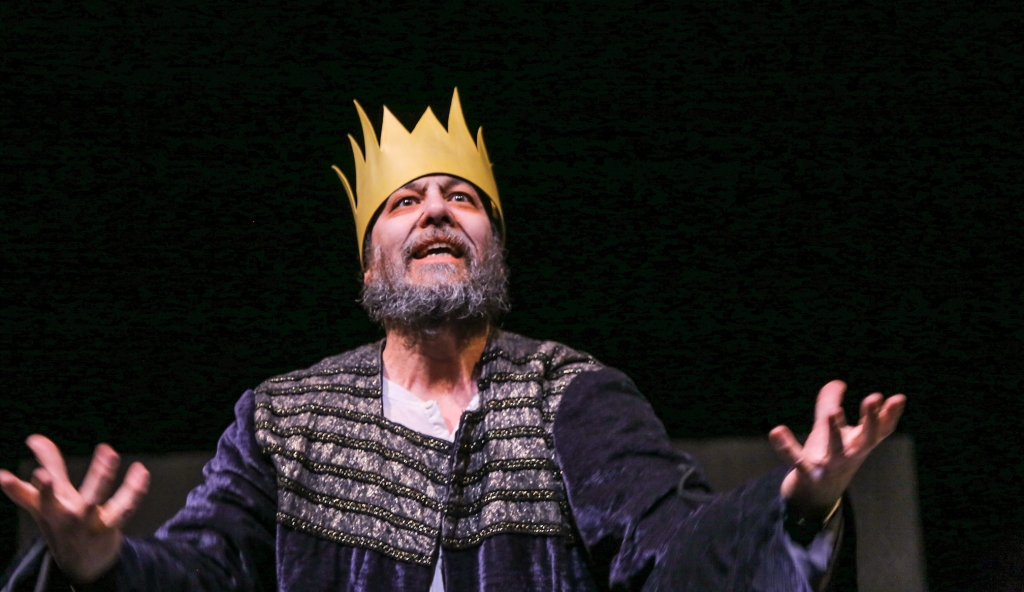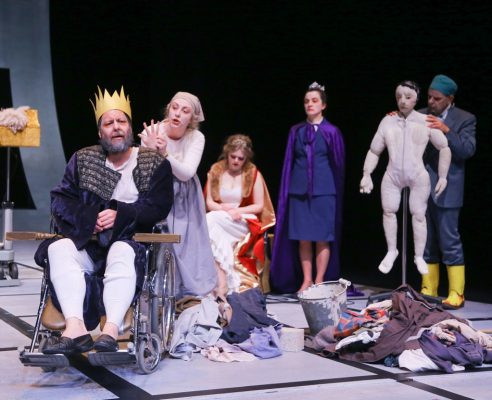Absurdist ‘anti-play’ explores meaninglessness of life
Posted on May 18, 2018 By Colin MacLean Entertainment, entertainment, Front Slider, Theatre
 Eugene Ionesco is a polarizing playwright. Along with Samuel Beckett (Waiting For Godot), he is the prime exponent of Theatre of the Absurd – an existential form of theatre that tells us that your life has no inherent value, other than what you impose on it. You’re on your own – and besides, we’re all going to die anyway.
Eugene Ionesco is a polarizing playwright. Along with Samuel Beckett (Waiting For Godot), he is the prime exponent of Theatre of the Absurd – an existential form of theatre that tells us that your life has no inherent value, other than what you impose on it. You’re on your own – and besides, we’re all going to die anyway.
To many, his plays are banal – even depressing.
“Words, Words, Words,” complained Charles Isherwood in the New York Times. To others, they are “brilliantly disagreeable.” Like a Cubist painting, you can read anything you want into them. We live in a time of wars, economic uncertainties and political upheaval and the only way to live with it, say the Absurdists, is to ignore our reality and look through a refracted lens.
 One of his later works, Exit The King (1962), is in production by the U of A’s Studio Theatre at the Timms Centre until May 26 – and despite formidable philosophical underpinnings, it is not difficult. You can see some very current comment on world affairs behind Ionesco’s not overly complex dramatic metaphors. The currency of the work is emphasized by the occasional contemporary references. The palace guard protests when the King is charged with gratuitous violence; he did it for “… national security.”
One of his later works, Exit The King (1962), is in production by the U of A’s Studio Theatre at the Timms Centre until May 26 – and despite formidable philosophical underpinnings, it is not difficult. You can see some very current comment on world affairs behind Ionesco’s not overly complex dramatic metaphors. The currency of the work is emphasized by the occasional contemporary references. The palace guard protests when the King is charged with gratuitous violence; he did it for “… national security.”
This translation (Ionesco is Romanian and writes in French) is from Australians Neil Armfield and Geoffrey Rush; Rush won a Tony for his portrayal of the King on Broadway in 2009.
The story is about 400-year-old King Berenger (Ian Leung), who once presided over a mighty empire of large armies and magnificent buildings. He could order the clouds from the sky. When he finally appears on stage, through the floor and in his underwear, he is a sad, diminished creature indeed. His kingdom is ravaged and his once formidable army has been reduced to one soldier. His subjects have melted. The Milky Way has curdled. His Royal Proctologist (Sparky Johnson) has determined that he will die in 90 minutes “…at the end of the play,” observes the Queen, candidly.
 The disintegrating King refuses to acknowledge his coming demise, giving the playwright room to pursue his favourite motifs: anxiety, fear, the meaninglessness of it all, our own insignificance, we’re all in the same boat (which is sinking) and, of course, we’re-all-going-to-die.
The disintegrating King refuses to acknowledge his coming demise, giving the playwright room to pursue his favourite motifs: anxiety, fear, the meaninglessness of it all, our own insignificance, we’re all in the same boat (which is sinking) and, of course, we’re-all-going-to-die.
Ionesco has surrounded the King by a colourful court of grotesques. The Doctor continuously reminds him of his imminent death. His no-nonsense, tart tongued Queen Marguerite (Beth Graham) wants him to hurry along and die with dignity. His second wife, Queen Marie (Lauren Hughes), loves him and tries to comfort him. His one last soldier (Michael Anderson) acts doggedly as if nothing is happening, bellowing out details of the King’s demise: “THE KING IS DEAD! … THE KING IS ALIVE AGAIN!” And Juliette (Meegan Sweet), the hilariously overworked comic attendant of classic theatre, flutters about providing some sorely needed comic moments.
 Working with such philosophic baggage, Ionesco goes as broad as a night at the Palace Vaudeville Theatre of 1932. No joke is to too hoary or farcical. The playwright constantly breaks down the fourth wall, even commenting on it in one scene. When the King goes on a bit, one member of the court complains, “Why doesn’t he stop speechifying?” To which the Queen replies, “He hasn’t run out of text yet.”
Working with such philosophic baggage, Ionesco goes as broad as a night at the Palace Vaudeville Theatre of 1932. No joke is to too hoary or farcical. The playwright constantly breaks down the fourth wall, even commenting on it in one scene. When the King goes on a bit, one member of the court complains, “Why doesn’t he stop speechifying?” To which the Queen replies, “He hasn’t run out of text yet.”
When the audience laughs at a joke he hasn’t told, the King glares at us and proclaims, “That wasn’t funny!” Exit The King is often kind of jolly.
Director Kevin Sutley understands what the writer is aiming for and manoeuvers his production rather skillfully between sentimentality and cartoonish farce. He even throws in a Keystone Kops, old-tyme, flickering, black and white chase scene.
Hughes, looking as if she just stepped out of Snow White, is steadfast in her love for the King and, despite her Disneyish appearance, gives considerable dramatic heft to her loving Queen Marie.
Graham adds to her sterling reputation as one of our most indispensable local actors with her Queen. Her face is an intense, frozen amalgam of Bette Davis in Whatever Happened to Baby Jane and Judith Anderson in Rebecca. She particularly shines in a long climactic monologue – helping the King through his final moments. It is one of the few genuinely warm and empathetic instances in a work that generally ignores intimacy to reach for the big emotions.
Leung strides through the show like the King he once was – commanding, grand and vulnerable, firing off gags, going through Shakespeare’s “Ages of Man” catalogue from childhood to demented old age, and all the while crumbling before our eyes. He has the best elderly dying scene since Lear expired, weeping over the body of his daughter. Except in this able actor’s hands, he dies not in sorrow – but in exultation.
In the end, the King becomes what Ionesco intended all along – in death, he becomes what we all are – “everyman.”
“A lot of fuss over nothing, wasn’t it?” muses Queen Marguerite at the end.
You many agree (or not) depending on your ability to put up with bizarre, over-the-top, disconnected humour and an existential view of life. Ionesco referred to Exit the King as one of his “anti-plays.”
At least you won’t be bored.
Photos by Ed Ellis













